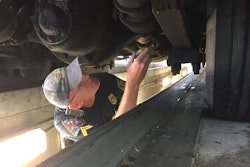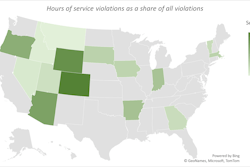Previously in this package: Correcting errors: How they can happen, how they hurt
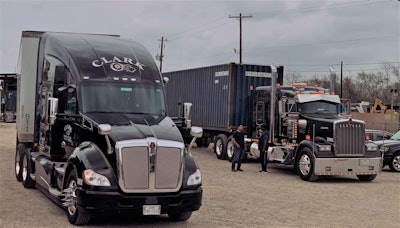 Having a DataQs review panel for appeals that includes one or more trucking representatives “would definitely make a difference” in the system’s overall fairness, said Danny Schnautz, a vice president with Clark Freight Lines.
Having a DataQs review panel for appeals that includes one or more trucking representatives “would definitely make a difference” in the system’s overall fairness, said Danny Schnautz, a vice president with Clark Freight Lines.
Violation challenges are the No. 1 reason owner-operators ever find reason to utilize the DataQs system. They’re also the least-successful category of challenge.
Part of the reason for that is that such violations, especially when not accompanied by an actual citation that can be challenged in court, are where disputes most often arise, as shown in brief in the first part of this package. Sometimes multiple appeals by the carrier are required to get an in-depth review. What irks many in trucking is the bias inherent in the review process, particularly when state departments’ decisions are complex or end up as a single judgment call by the original inspecting officer.
Some in law enforcement and the trucking community see an opportunity to improve the appeals process, drawing on models already in place. In the meantime, carriers using the system see it as structurally rigged to defeat most reviews and their appeals.


“Essentially, we’re having to do law enforcement’s job for them to prove they made a mistake,” said Adam Kleinschmidt, who works in the compliance department at the Owner-Operator Independent Drivers Association.
The time required to move an appeal through the system, furthermore, does its own damage. Eagle Express owner Leander Richmond, for instance, continues to wait on a challenge to a high-severity False Log violation sitting on Eagle's carrier record after being issued in late 2019 in New Mexico without an accompanying ticket.
“Even if you’re lucky enough to get a guy to say, ‘Maybe I was wrong,’ it’s taken you six to eight months,” if not longer, as Owen pointed out about such lengthy cases. “That whole time – guess what, the violation’s already in CSA. It’s already done the damage to your scores” and consequently your insurance rates and the ability to do business. “Even if you took the time to go through all that and get it reversed, it’s guilty until proven innocent. It’s really farcical the way it was designed.”
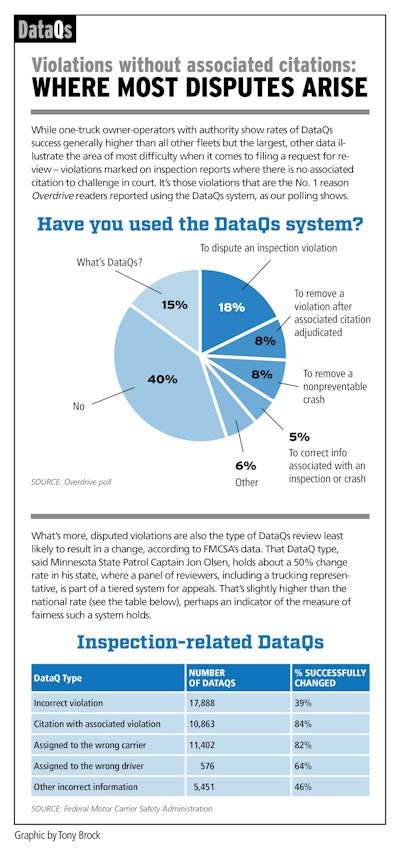
Jay Grimes, OOIDA’s director of federal affairs, presented DataQs concerns in 2019 at a U.S. Small Business Administration Ombudsman’s Regulatory Fairness Hearing. As a solution to improving the process, he suggested each state having a five-member review board. It would have two enforcement agency representatives, a state DOT rep, a carrier rep and a driver rep.
There have been moves in that direction already in some states. The first step in Minnesota’s tiered approach to DataQs reviews was detailed in part 1 of this series. After a carrier files the initial RDR (request for data review) and receives an initial decision and determination letter from the state patrol’s DataQs administrator, “our policy is carriers have 15 days to file an appeal,” said Captain Jon Olsen. The inspecting officer is not afforded the same appeal option.
If the carrier appeals, a three-member panel mediated by the DataQs administrator is established. “The carrier is invited in via in-person meeting or phone, depending on where they’re located,” Olsen said. “They have the opportunity to talk about why they’re filing and whatever their case is. The inspector has the same time to say what they believe, and talk about any evidence there is.”
That meeting is recorded, and the panel makes the decision. The panel includes one representative from trucking – “usually someone in the role of safety director” at a fleet, Olsen said, often from the St. Paul area, the state’s seat of government. Other members are “someone in our agency well-versed in regulations – usually someone who does training for us. It also involves a supervisor from our section,” often a lieutenant.
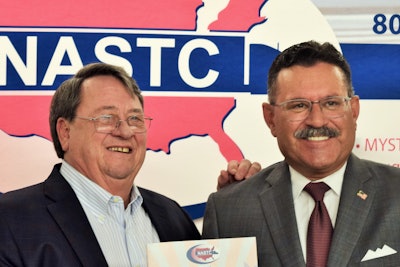 When the DataQs process to resolve an unfair violation drags out for months, “It’s already done the damage to your scores” and consequently the ability to do business, said David Owen, left, president of the National Association of Small Trucking Companies, pictured here with former FMCSA Administrator Ray Martinez.
When the DataQs process to resolve an unfair violation drags out for months, “It’s already done the damage to your scores” and consequently the ability to do business, said David Owen, left, president of the National Association of Small Trucking Companies, pictured here with former FMCSA Administrator Ray Martinez.
To that end, CVSA applied to FMCSA for high-priority grant funding for a potential pilot project, working with states to test the concept of an independent DataQs appeals panel approach. The funding was denied, but a collaborative agreement was struck, the alliance says, to “fully develop the concept of an independent DataQ appeal review board, managed by CVSA.”
“The idea is that CVSA or a group from CVSA would handle the second or third appeal,” said Turner, referencing Arizona’s appeals system as a potential model.
As in Minnesota, Arizona’s DataQs appeals are handled on a quarterly, as-needed basis by a panel. It typically consists of “a captain, a sergeant, our training coordinator, a trooper and a member of industry – sometimes two,” said Arizona Commercial Vehicle Enforcement trooper Jeremy Disbrow.
The Commercial Vehicle Enforcement department leans on the Arizona Trucking Association for referrals to carrier members to participate in the usually in-person meetings. At those, the panel reviews the complaint and its evidence, then “makes a determination. It’s a roundtable discussion, everybody provides their input, and that decision is final.”
Disbrow adds that there’s not always a need for a quarterly panel, as there are not always appeals that reach that level. When there is a need, typically they’re closing just one to three appeals a quarter.
Minnesota’s appeals are happening at similar levels. “In 2019 we had more than 350 DataQs” that were violation or wrong-carrier-type challenges, where Olsen notes the most disputes tend to arise. That same year, “we only had maybe four or five panels. It’s happening very infrequently.”
FMCSA has lauded both Arizona and Minnesota’s “review council” approach to DataQs appeals as a best practice in its DataQs Analyst Guide since at least 2014, the time of the last update to the guide. Yet CVSA’s Turner notes he knows of no other states that have taken a similar appeals approach.
In Kansas, where Turner formerly served with the highway patrol, current trooper and Public Information Officer Nick Wright notes that most DataQs are handled by one of eight individuals with the patrol, including himself and two other troopers, two lieutenants, a retired lieutenant “who works for us part-time,” and two Captains, he said.
Throughout the entire process, depending on who is handling the DataQ and its complexity, generally speaking “we’re all discussing these,” Wright said. If carriers don’t agree with a decision, oftentimes an outright appeal turns out unnecessary after further counsel with the carrier. “If they write back say, ‘I’m still not in agreement with this,’ sometimes I’ll try to clarify things further.”
Olsen noted he’s seen similar actions sufficient to settle many disputes before things get to an official appeals stage.
Initial appeals in Kansas do not go to a review panel like those in Arizona and Minnesota but through two different lieutenants and, if the carrier is still unsatisfied, to the captains.
As in other states, Kansas doesn’t get that many appeals “that go all the way to the top,” Wright said. “Those of us that are doing them at the ground level – we’re the instructors” for other department personnel. “We’ve got a lot of experience and we’re in the regs a lot. We look at them like a court case, essentially. We want to have our ducks in row.”
Wright says he’s not sure that his state has ever considered the review-panel concept involving industry. “I don’t know that there’s a huge need,” he said, but admits “some regulations can be tricky to navigate. … I wouldn’t be against a panel.”
New Hampshire State Police Staff Sergeant William Burke years ago did look at potentially having someone from the state trucking association join them in reviewing DataQs “but found that hard to do with our workload” and scheduling interruptions, he said. Today, sergeants in New Hampshire “discuss our plans for the next month or so and we review the DataQs as a group,” focused on those that need close analysis.
CVSA believes that putting a nongovernmental entity made up of enforcement and carrier representatives over the administration of review panels nationwide might help avoid opening the door to a more complex, court-based resolution. State panels convened by state authorities can end up looking like courts, as Turner sees it. Thus states “have to be careful when they form these in triggering the state’s administrative procedures act,” which he says exist in some form in every state.
Such acts in part govern court procedures and the rights of the citizenry. While everyone wants a “transparent procedure for fair DataQ reviews,” he added, “if you trigger an administrative procedures act, you have rules of evidence, filing fees, laws are involved.” Everything is then “appealable to the district court level.”
The DataQs system “was never meant to be what folks think it is – a court appeal and full process,” Turner said. “FMCSA has asked and states have tried to make it fair – really it’s just the carriers’ opportunity to correct” data collected about them.
In Arizona’s system, the panel’s decision on an appeal is final – unless FMCSA itself decides otherwise. In Minnesota, however, DataQs appellants can take their cases to the state court of appeals, said Olsen. Yet in the 11 years the system has been in place, no case has gone that far.
For truckers, there’s a feeling that this kind of adjudication of DataQs is well necessary, nonetheless. Polled about the need for some national approach to DataQs appeals, more than half of respondents answered in the affirmative.
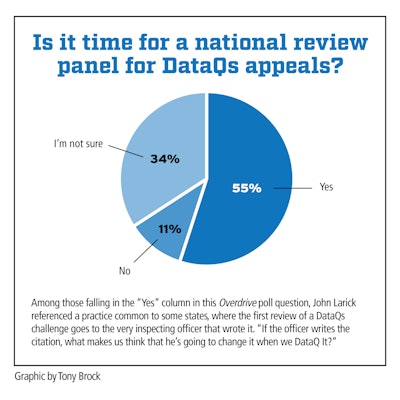
The review board concept “would definitely make a difference,” said Danny Schnautz, a vice president with 180-truck Clark Freight Lines. He gave the example of “stacked citations,” a problem his drivers, operating from the fleet’s base near Houston, have had for years going through local jurisdictions. For example, he noted an instance where a pigtail was unplugged, resulting in multiple lights not functioning, and each was written as a separate violation. “If it was a review board, they might’ve looked at each other and said give this trucker his justice.”
Ideally any improvement to the process would be more in the direction of a courtroom, Schnautz said. An impartial judge weighing evidence from both sides would give a carrier or driver a better shot at a correction or mitigation when it’s simply their word vs. that of an officer.
Haney also agreed that any kind of representative review panel would be helpful. Serving on the American Trucking Associations’ Accident Review Committee and other ATA panels, he notes it’s common to use “a team of pros,” such as safety directors and truck drivers, to adjudicate matters such as determining whether an accident was preventable or not.
That’s also now a part of the DataQs system, where carriers can submit certain crash types for preventability reviews. FMCSA’s Crash Preventability Determination Program became permanent in 2019, designed to allow carriers to request preventability determinations and potentially exclude nonpreventable crashes of certain types from a carrier’s Compliance, Safety, Accountability program scoring.
Haney’s fleet, like some others, has its own safety review board of mixed professionals to review accidents and other driver incidents. By contrast, the current DataQs system in some jurisdictions not only depends on a sole officer, and one who’s naturally inclined to hew to an original decision, but it’s someone who’s likely to approach infractions from a legalistic perspective.
“They look at it only as regulatory. That’s wrong, I’m sorry,” Haney said. “Safety is not achieved through compliance… Compliance should be an offshoot of company employee best practices, safety, policies and procedures,” Haney said. “When the enforcement officer is being jury and executioner, so to speak, you’re not getting anything other than a regulatory compliance perspective.”
The citation stacking practice points to what Schnautz sees as a wider problem, both in its own right and as another weakness in the entire enforcement structure that results in DataQs in the first place: a widespread view that financial incentives exist for law enforcement to issue violations that have little or no justification.
“We’ve seen it for decades,” Schnautz said. “There’s a lot of first-hand stories of officers knowingly generating their own payment by writing up vehicle maintenance issues.” In some years Clark has seen its CSA score worsen late in the year, which Schnautz believes is a reflection of certain jurisdictions pushing to meet year-end violation quotas.
Enforcement officers routinely deny that such quotas exist. Some states have laws prohibiting the practice, though some accounts say such laws often don’t get enforced.
Kansas trooper Wright points to performance standards he’s seen in past as a municipal police officer that come close to functioning like an incentive to reach a higher level of activity, a certain number of stops and tickets, but a quota it is not. “I think they’re illegal in Kansas,” he said. As for the revenuer charge, the highway patrol is funded by legislative appropriation, not ticket writing. Paid state patrol tickets go into the state’s general fund, or benefit county jurisdictions directly if a defendant elects to take a diversion program to avoid, for instance, conviction on a speeding charge.
Not all jurisdictions are built the same way, however. Schnautz gave the example of tickets issued over federal regulations that detailed to the millimeter the size of black or white borders framing diamond-shaped hazmat placards. “Officers were getting out a ruler,” he said, and issuing tickets for borders being a few millimeters off the stated amount.
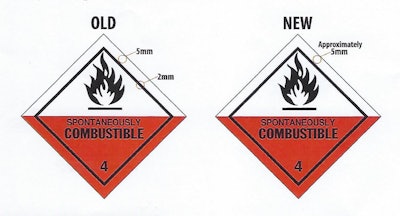 Many in trucking feel some enforcement departments put undue pressure on officers to write tickets. Danny Schnautz of Clark Freight Lines cites the example of tickets being written over trivial departures from hazmat placard design specs. As the diagram shows, the agency that authored the reg eventually added “approximately” to soften abusive enforcement. For the purpose of DataQs, a citation written for any violation at least does give a trucker a path directly through the court system to adjudicate the citation. If found not guilty, that can ease the path through the DataQs system to remove the associated violation.
Many in trucking feel some enforcement departments put undue pressure on officers to write tickets. Danny Schnautz of Clark Freight Lines cites the example of tickets being written over trivial departures from hazmat placard design specs. As the diagram shows, the agency that authored the reg eventually added “approximately” to soften abusive enforcement. For the purpose of DataQs, a citation written for any violation at least does give a trucker a path directly through the court system to adjudicate the citation. If found not guilty, that can ease the path through the DataQs system to remove the associated violation.
That kind of enforcement “is not about being safe,” Schnautz said. The practice was abused enough that the DOT agency in charge of that eventually added “approximately” to the regs’ measurement language, he said. “It was never PHMSA’s intentions for the border measurement to be an enforceable item,” said a regulatory alert issued in June.
Cleaning up the cases believed to be abuses of the violation system too often falls to the carriers’ ability to work their cases through DataQs. Turner estimates that should the agreement CVSA has struck with FMCSA bear fruit, it will be this fall before meaningful work on a pilot project for appeals gets under way in earnest.
Captain Olsen, noting that no single case has ever it made to the state court of appeals after being decided by Minnesota’s panel, believes industry involvement in adjudicating appeals is key for the integrity of the system.
“Having a carrier involved in that panel is key to really solidifying [the decision] and helping the carriers making the challenges feel good about the decision, whether they agree with it or not,” he said. “There’s respect for the process, even if you don’t agree with the answer.”
Read next: How to mount an effective DataQs challenge
More in the "Setting the Record Straight" package:
Criticism mounts of DataQs crash/inspection-info review system
Correcting errors: How they can happen, how they hurt
Podcast: Fairness in Minnesota's DataQs appeals process
